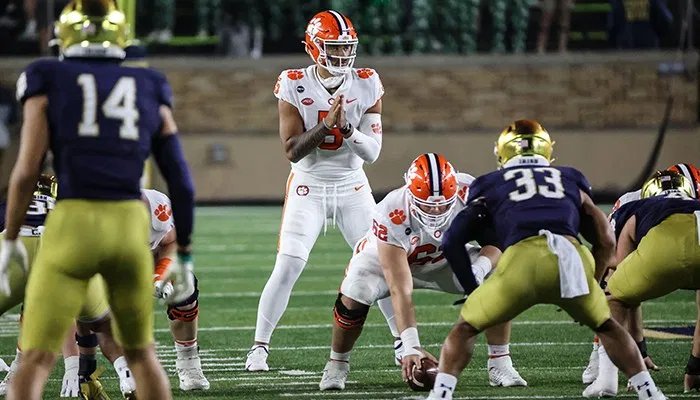
On Saturday, Clemson football suffered its first loss since last season’s national championship game. Dabo Swinney’s team traveled to South Bend to face the No. 4 Notre Dame Fighting Irish. Clemson failed to score on its final possession in the double-overtime thriller, giving the Irish their first win against the Tigers in over 40 years.
While freshman quarterback D.J. Uiagalelei put on another inspiring performance, he couldn’t pick up his second consecutive win as a starter. Trevor Lawrence watched from the sideline as his team fell 47-40 against Ian Book and Kyren Williams. The loss is a reality check for the nation’s former No. 1 team. Swinney’s program has a lot of difficult lessons to take away from their disappointing defeat.
Game management and play calling failed
With 2:10 remaining in the game, Notre Dame turned the ball over on downs. Book’s pass to Ben Skowronek fell harmlessly to the ground, and the quarterback dropped his head briefly. The game should’ve ended there. However, Clemson’s offense bungled their chance to end the game in regulation.
Clemson’s defense shouldn’t have needed to retake the field after stopping the Irish on fourth down. Instead, the unit had to face Book with over 1:40 left in the game. Despite the defense stonewalling Notre Dame on what seemed like a make-or-break drive, Clemson’s offense and punt team only used 30 seconds of game clock.
While the Fighting Irish capitalized on Clemson’s mistakes, the Tigers beat themselves with that failed drive, which ended with Travis Etienne running out of bounds and stopping the clock on a third-and-14 play. Notre Dame and Brian Kelly did a great job managing the clock and not throwing in the towel.
That final drive by the Tigers in the fourth quarter summed up Clemson’s entire game. Clemson kicked four field goals, and the team failed to do anything with the fumble Book lost late in the third quarter. So many potentially momentum-swinging moments went to waste.
Player health is crucial
The Tigers entered their Saturday matchup against Notre Dame with a long list of injuries. Obviously, Lawrence sat as he awaited clearance from the conference after contracting COVID-19 over a week ago. However, Clemson also went without defensive captain James Skalski, linebacker Mike Jones Jr., defensive tackle Tyler Davis and defensive end Justin Foster.
Clemson suffered another loss during the game when starting guard Matt Bockhorst went down. Several defensive players, including Bryan Bresee, Andrew Booth Jr., Nolan Turner and Lannden Zanders also suffered injuries. Perhaps the Tigers could’ve survived those injuries in previous seasons when the depth chart featured more experienced players. However, it’s quickly becoming apparent that this roster isn’t on par with its 2018 and 2019 editions.
Losing Bockhorst stings, especially if he has to miss multiple weeks. Clemson’s offensive line was already inexperienced and struggling to establish the running game. Things could get even worse without the third-year guard. As for the defense, it can’t suffer any more hits.
Clemson’s dominant defense is fading this year
For years, Clemson’s defense served as the team’s engine. The unit reached the peak of its power in 2017 and 2018. However, many of Clemson’s star defenders are making plays on Sundays in the NFL now. The recent losses only amplify the significance of Clemson’s recent injuries and suffering depth.
Last year’s defense sent Tanner Muse, Isaiah Simmons, A.J. Terrell and K’Von Wallace to the NFL. All four of those players could join the Tigers tomorrow and rank among the top six defenders on the roster. Clemson hasn’t replaced its recent losses on defense, and it’s beginning to show.
Freshmen Bresee and Myles Murphy seem destined for greatness. However, they’re still a year away from morphing into players that could even begin to rival former superstars like Clelin Ferrell and Christian Wilkins. The dominant run defense established by a powerhouse defensive line and agile linebacking corps is gone.
Booth Jr. and Derion Kendrick offer hope in the secondary, but neither cornerback compares well to Trayvon Mullen or Terrell. There’s still time for this unit to grow, but Clemson needs players ready to play at all-conference levels now. Clemson football doesn’t have that kind of talent.
Williams carved up Clemson’s defense for 140 rushing yards and three touchdowns. Notre Dame finished the night with 209 total rushing yards on 41 carries (5.1 yards per carry). Meanwhile, Book threw for 310 yards and a touchdown. He was the first player to throw for over 300 yards against Clemson football this season. The Tigers only gave up roughly 174 passing yards per game in the seven previous matchups.
Perhaps getting Skalski and company back from injuries will save Clemson’s defense, but things aren’t looking too good for Brent Venables’ squad.
Uiagalelei is the future
Uiagalelei missed Amari Rodgers on a play that would’ve given the Tigers first-and-goal on their first drive in the second half. Outside of that play, the true freshman had very few mistakes. He completed 65.9% of his pass attempts against a good Notre Dame defense for 439 yards and two touchdowns.
Without the benefits of a Tee Higgins or Justyn Ross, Uiagalelei connected with Cornell Powell for 161 yards and Rodgers for 134 more. When Swinney stops brooding over the Notre Dame loss, he’ll smile, knowing that Clemson has another future NFL quarterback. Assuming Lawrence leaves for the draft after this season, Uiagalelei will start for Clemson football for at least two years.
My name is Sam Teets, and I’m a sports communication and history double major at Clemson University. When I graduate, I want to get into sports media and hopefully begin writing for a major website or publication. For constant sports articles, polls, and statistics, follow me @Sam_Teets33 on Twitter or Facebook.

